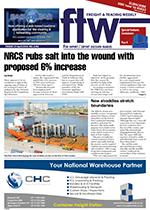There appears to be no resolution in sight to the ongoing saga of delays in the issuing of Letters of Authority by the National Regulator for Compulsory Specifications. And to add insult to injury, the organisation has applied for a 6% increase in LOA costs and levies effective from April 1.
“Technically it hasn’t been implemented because it hasn’t yet been approved by Treasury and the Department of Trade & Industry (dti), but we expect they will approve it and charge it retrospectively,” Mark Saunders of the SA Domestic Appliance Association (Sada) told FTW.
Sada has lodged an objection on the grounds that this cannot be justified in light of the current service levels. According to Saunders the NRCS has not been meeting its 120-day turnaround target and the situation has been further aggravated by a new requirement implemented last year for certain appliances that now require a safety certificate as well as an energy efficiency certificate.
“This has impacted on the work load and slowed things down further.” NRCS spokesman Daniel Ramarumo told FTW that the NRCS was receiving more than 1300 applications per month with a high number of these a rework due to incomplete or wrong documentation submitted by applicants.
“Even though the age analysis of applications is constantly monitored by the NRCS, occasionally some applications do exceed 120 days and when identified interventions are implemented to adhere to set timelines.”
He said the NRCS was currently implementing a risk-based approach to approvals which separated new applications from renewals and low risk from high risk. “Renewals and low-risk applications are processed through an expedited process using applicable checklists,” he said.
“The debate is on-going,” Stefan Sakoschek, regional director of the EU Chamber of Commerce and Industry in South Africa, told FTW. “There have been meetings with the EU delegation about the delays, and based on a recent meeting with NRCS, the backlog is building up again.”
One of the problems, according to Saunders, is the fact that everything is accomplished manually in what should be a technically orientated environment. “They’ve been talking about a new IT platform to speed up LOA applications for a number of years and are no closer.”
Commenting on the issue of staff competence, Ramarumo said the organisation had recruited six trainee inspectors who were undergoing a twoyear fast-tracked training programme. “The current total staff complement of evaluators including trainees is 13.” Clifford Evans, Customs liaison manager at Berry & Donaldson in Cape Town, told FTW that in Cape Town, the NRCS had been a permanent item on the agenda of The Port Liaison Forum (PLF), an initiative of the Cape Chamber of Commerce and Industry, until March this year. “But we have removed it until further notice because despite our best efforts, there has been no progress or improvement at all.”
Without these LOAs, which provide proof of compliance with SA standards, Customs will not release the goods to importers. PLF chairman Mike Walwyn agrees that there has been no improvement.
“NRCS quotes a time period of 120 working days to process applications, and that often means that the importer’s window of opportunity in terms of selling his product here has closed by the time the LOA is issued. Interestingly they did state some time ago that waiting time would be reduced to 120 calendar days, but that soon went back to working days.”
As things stand, there is no end in sight, according to Walwyn. “An interesting illustration is with tyres, where clearly this kind of control is absolutely necessary. The only problem is that NRCS doesn’t have the equipment to test the tyres properly, so samples have to be brought here, then sent to Europe for testing, and only after that can LOAs be issued.”
He said there was also some selective fast-tracking of certain applications, which meant that others were waiting longer. “It’s the kind of thing that lends itself to abuse.” Kingfisher Freight Services managing director, Alwyn Nel, expressed his frustration at time wasted through lack of service. “You can call them and either the phone just rings or the person who answers has no idea of the status of the application,” he said.
“A recent case took hours of time by phone, three trips to Pretoria and back plus staff costs with not even any assurance of completion,” he told FTW. “In the interim our principal is paying storage and handling costs at origin for something that is easy to complete.” Ramarumo said the NRCS was continuing to meet with industry through their associations and individually.
INSERT
Renewals and lowrisk applications are processed through an expedited process. – Daniel Ramarumo

